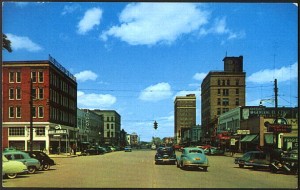Tres Jackson opened Epiphany Farm-to-Fork Cuisine in 2003 when the owner of Arman’s Restaurant sold his restaurant. Epiphany focuses on locally grown organic food. According to Tres Jackson, the farthest the restaurant ventures out to source its food is 160 miles. The Farm-to-Fork movement is a growing trend that involves supporting locally grown agriculture by buying their produce for restaurant use. In some cases, farm-to-fork restaurants even have farms on site and get their produce from their own garden.
Epiphany only employs twenty people, and they can do as much because they are open only nights from 5:00 pm until an unspecified time. I asked Jackson about when they closed he said it all depends on business. Since Epiphany is a local restaurant they can regulate their own labor and sales by the amount of business they are doing per night and if they are not getting the business they need then they can close for the night. Epiphany’s operation is a team effort. Employees, split their tips between all servers and this encourages their staff to work together in all aspects of the restaurant so that they can all make good money by the end of the night. According the ReferenceUSA the average sales volume per year of Epiphany is at $640,000 dollars (1).
I personally walked by the restaurant on a friday night in 2014 and it was almost impossible to get in. The restaurant brings in tourists because of its local craft beers and its local foods. Jackson says that they can tell you exactly where your food comes from. He says they can tell you the

Image of Greensboro Avenue in the 1950s as seen on http://www.rootsweb.ancestry.com/~altuscal/visual/
exact plot of ground your vegetable came out of, where the rabbit your about to eat likes to eat, and where the beer that you are drinking is coming from. Epiphany is funding Alabama local breweries and local farmers on a daily basis.
The Farm-To-Table movement came around in the 1960s and 1970s. As people started to flock towards cities in the early 20th century, local sources of food began disappearing. The advancements in technology started to allow us to bring food from further away. People started to rely on processed food more because it was now convenient. McDonald’s and other fast-food businesses would capitalize on this new lifestyle in cities of the 20th century. In the 1960s and 1970s people started to look towards the quality of their food and they strayed away from convenience. These local foods started to be more available and the food-to-table movement started.
The menu changes based around what Tres Jackson can order locally that week. In 2007, Epiphany suffered a fire behind the bar that forced Epiphany to close and reopen with a brand new look. Matt Hawk with the Tuscaloosa News says that the fire destroyed the bar and the restaurant experienced extensive smoke damage that made the restaurant close for three weeks. Epiphany Restaurant is doing more environmental good than bad because they are supplying local farmers with income and local farmers are not using preservatives and antibiotics like most big firm producers. Jackson says that Epiphany continues to grow every year and he is currently looking forward to the home football games in Tuscaloosa.
Healthy food is becoming increasingly available to consumers, which is making healthier foods easier to purchase. This is driving the prices down of healthier products and allowing places like Epiphany to bring their prices down also. The strengths of local food is that the food has more nutrients due to the fact that the food is not being shipped long distances to its final destination. The food has to be less than 400 miles from its origin to be considered a local food. Environmental benefits of the farm-to-table dining experience are that the food is local! There are fewer miles to transport food, which means that there are fewer transmissions. Fewer miles traveled equals less CO2 and less fuel used.
Sources:
1) http://www.referenceusa.com.libdata.lib.ua.edu/UsBusiness/Detail/Tagged/d59c2ecaeeff458ebfd124ccd1e2db51?recordId=531051357
2) Image 1-http://www.tripadvisor.com/Restaurant_Review-g30889-d1314820-Reviews-Epiphany_Cafe-Tuscaloosa_Alabama.html
3) Image 2 -http://www.rootsweb.ancestry.com/~altuscal/visual/
4) Video 1 -http://www.youtube.com/watch?v=QfLv7aaavfY
